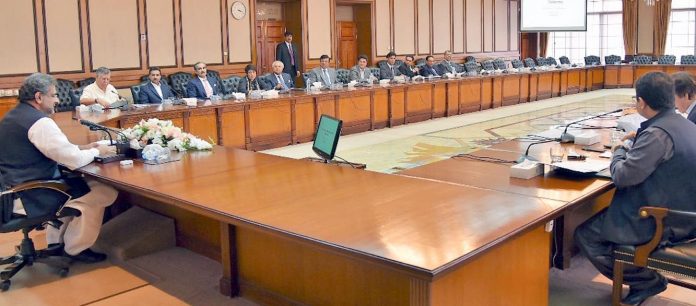ISLAMABAD: The newly constituted Economic Advisory Council (EAC) met here on Thursday. Prime Minister Shahid Khaqan Abbasi chaired the meeting.
In his opening remarks, the Prime Minister said the council had been reconstituted and assigned the task to suggest possible measures for improvements in the economy, especially in the context of the next budget. He expressed the hope the EAC would come up with positive proposals in the short time available for promoting measures for strengthening economic performance of the country.
Adviser to PM on Finance Miftah Ismail briefed the meeting about the current state of the economy, and added that despite the challenges and difficulties, it was moving on the path of growth and the target of 6 per cent growth for the current fiscal year would be achieved. He said the economy is on a high growth trajectory, inflation has been brought down, interest rates are lowest in decades, credit to private sector is at historic high and fiscal deficit has been reduced while PSDP and social safety spending continue to rise. Miftah Ismail added that economy is in an expansionary mode supported by pro-growth policies.
The adviser highlighted the addition of 10,000 MW of electricity and 1,200 mmcfd of gas in 2018. He cited increased investments under CPEC in energy, rail and road infrastructure, and related sectors that would spur economic development. He added that improved security environment has encouraged private investors to contribute their share in accelerating growth. He said Tax-to-GDP ratio has increased from 9.8 per cent (2012-13) to 12.5 per centt (2016-17). The National Financial Inclusion Strategy has helped expand outreach of financial services to a greater segment of population.
He also briefly shared with the members, the broad contours of the forthcoming budget 2018-19 aimed at sustaining economic growth and emphasized that measures for fiscal consolidation need to be continued. He said the budget would reflect the government’s resolve to enhance the tax-to-GDP ratio and relief measures for the vulnerable would be strengthened
Convener of the EAC, Shaukat Tareen speaking on the occasion highlighted the role assigned to the Council. He emphasized that having a charter of economy was the need of the hour to achieve sustainable growth and development. He stressed giving more incentives and facilitation to domestic investors and development of the housing sector. He invited members of the council to express their views and suggest measures for improvement in the economy.
The EAC members agreed to the proposal of having a charter of economy and said political parties should endeavour to make it possible. They were also unanimous in giving the opinion that enhancing exports was the key to having a robust economy but for that, expansion in economic base was instrumental. They said improvement in the sphere of ease of doing business, reforms in the system of taxation, broadening of tax base and establishing a strong capital market and financial services supporting the needs of a growing economy, were also extremely important. The EAC members also called for greater engagement of overseas Pakistanis for economic development in the country. They also gave views on the government’s measure of introducing a tax amnesty scheme and hoped, if well implemented, it would generate positive results.




